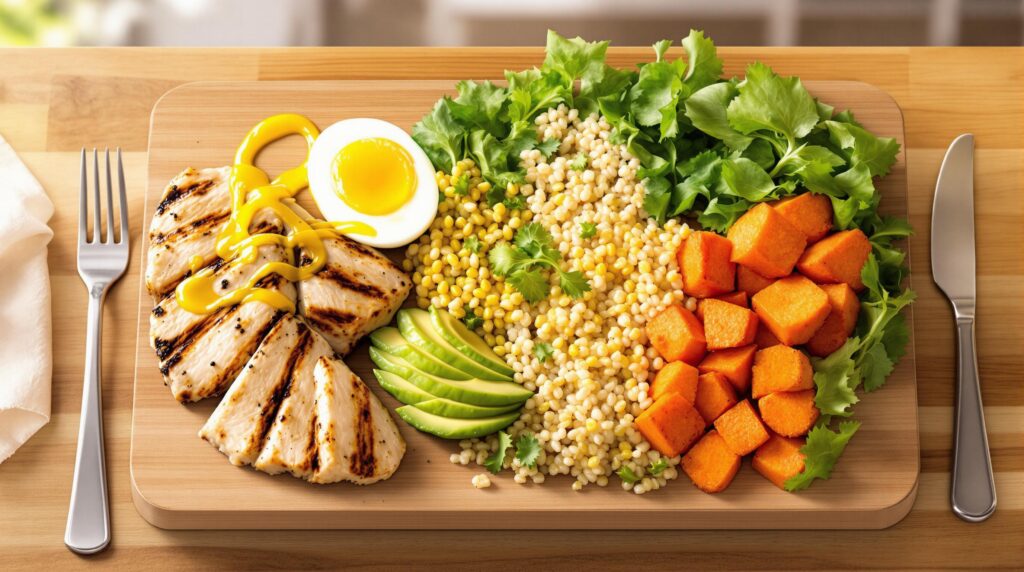Ever wondered why the Mediterranean diet is so loved? It’s not just for its tasty food. It’s a way of life, filled with tradition and beauty from the Mediterranean Sea. This diet focuses on whole foods, plants, and healthy fats.
It’s a healthy way to eat that’s good for your body and mind. Here, you’ll learn about Mediterranean food, its health perks, and how to start eating this way.
What is the Mediterranean Diet?
The Mediterranean diet is more than just food; it’s a way of life. It comes from the cultures of Greece, Italy, and Spain. It’s all about enjoying fresh, seasonal foods and eating together with others.
By choosing *Mediterranean food*, you get to enjoy flavors that are rich and full. It’s about quality over quantity.
Origin and Cultural Significance
The Mediterranean diet started from the farming ways and traditions of these areas. Meals are shared with family and friends, creating a sense of community. This shows how important *Mediterranean food* traditions are for health and happiness.
Key Principles
The Mediterranean diet has key principles for a healthy diet. These include:
- Prioritizing plant-based foods like fruits, vegetables, and legumes.
- Incorporating whole grains for energy.
- Using healthy fats, like olive oil, instead of saturated fats.
- Limiting red meat and processed foods, and choosing lean proteins like fish and poultry.
This diet not only improves health but also makes eating more enjoyable. The Mediterranean diet shows how food can nourish us and bring people together.
Health Benefits of the Mediterranean Diet
The Mediterranean diet is more than just food; it’s a way of life. It offers many health benefits. This makes it popular for those wanting to feel better.
Heart Health
The Mediterranean diet is great for your heart. It’s full of fruits, veggies, whole grains, and healthy fats like olive oil. This can lower your risk of heart disease.
Studies show it helps keep cholesterol levels down and improves heart function.
Weight Management
Looking to lose weight? The Mediterranean diet is a good choice. It helps you eat the right amount of calories and stay full. You’ll enjoy meals with fresh ingredients, avoiding overeating.
Reduced Risk of Chronic Diseases
Following the Mediterranean diet can lower your risk of chronic diseases. It may help prevent type 2 diabetes and some cancers. It also supports brain health, which can help prevent cognitive decline as you get older.

Key Components of the Mediterranean Diet
The Mediterranean diet is full of foods that are good for your body and soul. These foods are full of flavors, colors, and health benefits. Let’s look at the main parts that make up the Mediterranean diet.
Fruits and Vegetables
Fruits and vegetables are the heart of the Mediterranean diet. Try to eat 5 to 10 servings a day. Fresh and seasonal produce adds vitamins, minerals, and great flavors. Here are some examples:
- Tomatoes
- Spinach
- Bell peppers
- Berries
- Citrus fruits
Whole Grains
Whole grains are key in the Mediterranean diet. They give you fiber and nutrients. Choose from:
- Brown rice
- Quinoa
- Barley
- Whole grain bread
- Oats
These foods help with digestion and keep your energy up all day.
Healthy Fats
Healthy fats are a big part of the Mediterranean diet. Extra virgin olive oil is a main source, packed with antioxidants and good fats. Nuts like almonds and walnuts add more benefits. These fats are good for your heart and can lower cholesterol.

Foods to Include in Your Mediterranean Diet
Adding a variety of nutrient-rich foods is key to enjoying the Mediterranean diet. This diet focuses on whole ingredients that boost health and wellness. Include staples like olive oil, fish, and legumes to enhance your meal plan.
Olive Oil and Nuts
Extra virgin olive oil (EVOO) is the main fat source, known for its heart benefits. Use EVOO instead of butter to add flavor and antioxidants to your meals. Nuts like walnuts and almonds are great for snacks, providing healthy fats and protein.
Fish and Seafood
Eating fish and seafood three times a week is a key part of the Mediterranean diet. They are rich in omega-3s, which help reduce inflammation and support heart health. Choose local catches or high-quality seafood for your meals.
Dairy and Legumes
Dairy is consumed in moderation, but fermented products like yogurt and cheese are good for probiotics and nutrients. Opt for low-fat versions. Legumes, such as beans and lentils, are a great protein source and boost gut health. They are essential for a balanced Mediterranean diet.

| Food Group | Recommended Servings | Benefits |
|---|---|---|
| Extra Virgin Olive Oil | 1 to 4 servings per day | Rich in healthy fats; supports heart health |
| Fish and Seafood | 3 servings per week | High in omega-3 fatty acids; good for brain health |
| Nuts | 3 servings per week | Provides healthy fats, protein, and fiber |
| Dairy (Low-Fat) | No more than once daily | Source of calcium and probiotics |
| Legumes | 3 servings per week | High in protein and fiber; aids digestion |
Learn more about the Mediterranean diet by checking out this guide. It offers detailed insights and practical tips for adopting this lifestyle.
Foods to Avoid on the Mediterranean Diet
Starting the Mediterranean diet means choosing whole, nutrient-rich foods. This approach offers a wide range of tasty options. Yet, there are certain foods you should limit or avoid for the best results.
Processed Foods
Try to eat less of processed foods. They often have too much sodium, unhealthy fats, and preservatives. These can upset the diet’s balance. Stick to fresh, whole foods to keep your body healthy.
Sugary Beverages
Drinking sugary beverages can make you gain weight and harm your health. Switch to water, herbal teas, or black coffee instead. This choice is in line with the Mediterranean diet, focusing on healthier hydration.
Red Meat Consumption
Eat red meat no more than once a week. Choose lean poultry or plant-based proteins instead. This change reduces saturated fats and adds variety to your diet.

How to Get Started with the Mediterranean Diet
Starting the Mediterranean diet takes thought and planning. First, look at what you usually eat. This helps you see where you can make changes. Then, plan your meals to try new Mediterranean recipes with fresh foods and healthy fats.
Shopping for groceries becomes fun as you look for fresh ingredients. Try to avoid processed foods.
Assessing Your Current Diet
Start by checking what you normally eat. Note your favorite foods and those you eat too much of. Knowing this helps you slowly change to the Mediterranean diet.
Planning Your Meals
Meal planning is key for beginners. Create weekly menus with different, tasty dishes. Make sure to include lots of fruits, veggies, whole grains, and legumes. This makes your meals varied and enjoyable.
Grocery Shopping Tips
When shopping, go for the outer aisles for fresh foods. Stock up on fruits, veggies, olive oil, and lean proteins like fish and chicken. For more tips on a heart-healthy Mediterranean diet, check out this guide. Stay away from the middle aisles with processed foods. Focus on fresh, whole foods to start your new diet right.
Meal Planning Ideas for the Mediterranean Diet
Adding a variety of tasty dishes to your Mediterranean diet meal plan makes healthy eating fun. Look into easy breakfast ideas, tasty lunch recipes, and great dinner options. These choices highlight the diet’s focus on freshness and nutrition.
Simple Breakfast Options
- Try oatmeal topped with fresh berries and a drizzle of honey.
- Enjoy Greek yogurt with a sprinkle of nuts and seeds for added crunch.
- Prepare a smoothie using spinach, banana, and almond milk for a quick on-the-go meal.
Flavorful Lunch Recipes
- Make a quinoa salad with chickpeas, cucumber, and a splash of lemon dressing.
- Create whole-grain wraps stuffed with roasted red peppers, arugula, and hummus.
- Assemble a Mediterranean grain bowl with farro, cherry tomatoes, and feta cheese.
Delicious Dinner Selections
- Grill salmon and serve with a side of roasted vegetables drizzled in olive oil.
- Cook a comforting chickpea stew flavored with garlic, cumin, and spinach.
- Prepare a traditional pasta dish with whole-grain noodles, fresh basil, and cherry tomatoes.
Mediterranean Diet for Special Diets
The Mediterranean diet is flexible, making it great for different dietary needs. It works for vegetarians, vegans, and those who need gluten-free options. You can enjoy the vibrant flavors of the Mediterranean while sticking to your diet.
Vegetarian and Vegan Options
Vegetarians can boost their protein by adding more legumes, nuts, and seeds. These foods add nutrients and flavor to Mediterranean dishes. Vegans can use plant-based dairy substitutes. Eating a variety of fruits, vegetables, and whole grains keeps your diet healthy and tasty.
Gluten-Free Choices
Following a gluten-free diet doesn’t mean missing out on Mediterranean flavors. Try using quinoa, corn, or gluten-free pasta instead of traditional grains. These options keep your meals rich in taste and health benefits. The Mediterranean diet is welcoming to everyone.
Common Misconceptions About the Mediterranean Diet
Many people doubt the Mediterranean diet, seeing it as just another trend. But it has a long history and proven health benefits. It’s also not as expensive as you might think, thanks to using local and seasonal foods.
It’s Just Another Trend
Some say the Mediterranean diet is just a passing fad. But it has been around for centuries. It focuses on whole foods and balanced eating. This diet can make you healthier and happier, encouraging you to eat with family and friends.
Too Expensive to Follow
People worry that the Mediterranean diet is too pricey. But it’s actually quite affordable. You can eat well without spending a lot by choosing grains, legumes, and fresh produce. Here’s a look at how it compares to more expensive, processed foods:
| Food Item | Average Cost (Mediterranean Diet) | Average Cost (Processed Alternatives) |
|---|---|---|
| Olive Oil (1 liter) | $8 | $10 |
| Quinoa (1 lb) | $4 | $5 |
| Fresh Vegetables (per pound) | $2 | $3 |
| Seasonal Fruits (per pound) | $1.50 | $2.50 |
| Legumes (1 lb canned) | $1 | $2 |
These comparisons show that the Mediterranean diet is both affordable and healthy. By choosing whole foods over processed ones, you can enjoy a wide variety of dishes. This supports your health and your budget.
Tips for Sticking with the Mediterranean Diet
Starting the Mediterranean diet can be fun. It helps to have friends and family support you. This makes it easier to keep going.
Finding Support
Having a support group makes a big difference. Look for local groups or online forums. Sharing meals and recipes with loved ones makes it more enjoyable.
Making It a Lifestyle
Don’t see it as a quick fix. Make small changes slowly. Adding more fruits, veggies, and whole grains to your meals is a good start. Enjoy the journey and the new flavors you discover.
| Support Types | Description |
|---|---|
| Community Groups | Local gatherings that share recipes and meal prep tips. |
| Online Forums | Virtual meeting spaces to exchange ideas and experiences. |
| Family Involvement | Encouraging shared meals fosters a supportive eating environment. |
| Culinary Classes | Hands-on workshops to learn Mediterranean cooking techniques. |
Conclusion: Embracing the Mediterranean Diet for Life
Adopting the Mediterranean diet means choosing a lifestyle filled with fresh foods, healthy fats, and exercise. It’s more than just what you eat; it’s about living fully. It promotes community, laughter, and enjoying meals together. This diet can help you live longer and healthier.
Making the Mediterranean diet part of your daily life is easy and fun. Focus on eating fresh veggies, whole grains, and lean proteins. This diet lets you make tasty meals that you love. For more on its benefits, visit: health benefits Mediterranean diet.
As you start following the Mediterranean diet, you’ll see benefits beyond just health. Your life will improve in many ways. Begin this journey today and see the positive changes it brings to your life.



